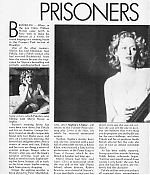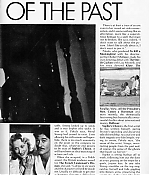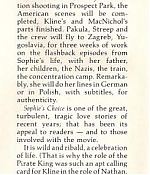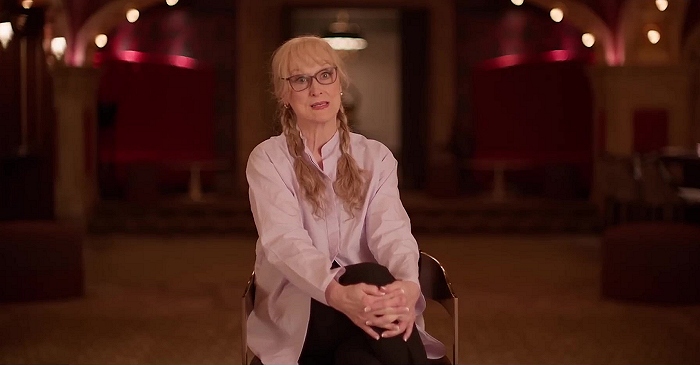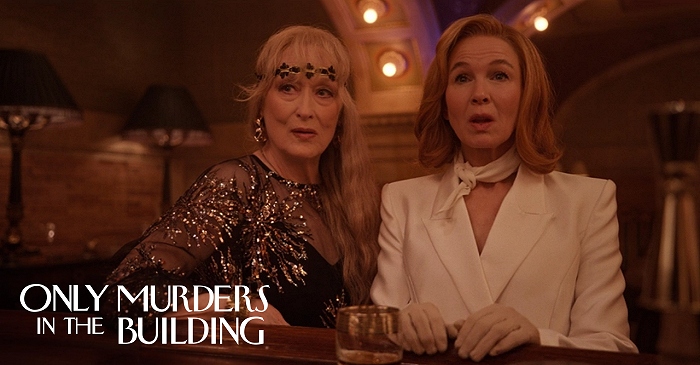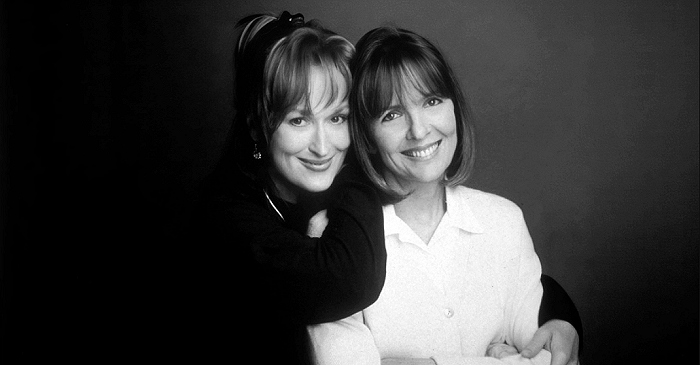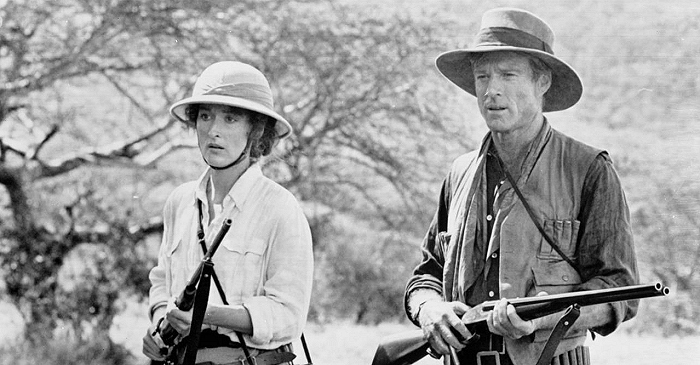|
Simply Streep is your premiere online resource on Meryl Streep's work on film, television and in the theatre - a career that has won her acclaim to be one of the world's greatest living actresses. Created in 1999, Simply Streep has built an extensive collection over the past 25 years to discover Miss Streep's body of work through thousands of photographs, articles and video clips. Enjoy your stay and check back soon.
|
|
Prisoners of the Past
Marquee Magazine ·
November 1982
· Written by Charles Champlin
| ||
Brooklyn – When, in the late 1940s, William Styron came north to New York to make his fortune as a writer, he found lodgings in a rooming house in the Prospect Park section of Brooklyn. One of the other roomers, Styron has told filmmaker Alan Pakula, was a Polish woman who had survived Buchenwald. Years later the woman became the inspiration for Styron’s bestselling and partially autobiographical novel, “Sophie’s Choice”, which Pakula is now filming with Meryl Streep as Sophie.
Styron’s rooming house has since been torn down, but Pakula and his art director, George Jenkins, found an ideally comparable house only two blocks away, and now, on a sunstruck morning, the lawns thick and green after a heavy winter of snow and rain, Pakula and his crew are doing a series of exterior pickups: Stingo, who is Styron’s alter ego and the book’s narrator, arriving, want ads in hand, to rent his room; Sophie seeing her lover, Nathan, off to work on the front steps; Sophie coming back from grocery shopping. Stingo, the aspiring novelist, is being played by Peter MacNichol, who was in “Dragonslayer” and who, after “Sophie’s Choice”, will return to the Pulitzer-Prize-winning play “Crimes of the Heart”, for which he received sensational notices.
Nathan, Sophie’s stormy lover and, like her, someone with a past full of unbearable secrets, is Kevin Kline, who received a Tony for his performance as the Pirate King in “Priates of Penzance”, which he also filmed in London not long ago. Meryl Streep had first read “Sophie’s Choice” in manuscript while she was still at the Yale Drama School, whose director, Robert Brustein, was a friend of Styron’s. It was manifestly a great part for some actress, although a half-dozen years ago she was not certain she was yet the one to do it. But she believes that everything you do prepares you and builds you for the next challenge, and when Pakula and his co-operator Keith Barrish offered her the role, she was in fact an almost inevitable choice. As has been widely reported, Streep spent five months learning Polish before rehearsals began. “Getting your mouth around those sounds is very hard,” she says. But once she had the accent, she evidently had the character. Pakula and her two co-stars have all reported their astonishment when, at the first reading round a table, Streep looked up to speak and it was Sophie who spoke. It was as if, Pakula says, Meryl Streep had ceased to exist. Even allowing for enthusiasm and hyperbole, there is too much unanimity on the point in the company to doubt that, whatever else proves to be true of “Sophie’s Choice”, it will have been an ideal matching of actress and role. When she accepted, in a Polish accent, the British academy award for “The French Lieutenant’s Woman”, she said, “Call me in six years and the character will still be inside me. Usually it’s difficult to get into a character; this one is difficult to get out of.” There is at least a trace of accent even in her casual set-side conversation, and it seems nothing like an affection, more like a superstitious homage to a spell that must not be broken. She says, indeed, “I don’t want to talk about the picture. I don’t like to talk about it; I don’t want to jinx it.”
Pakula, who produced “To Kill a Mockingbird” with his director partner Robert Mulligan, made his own directing debut with “The Sterile Cuckoo” with Liza Minelli, and has since directed “Klute”, “The Parallex View”, “All the President’s Men” “Comes a Horseman” and, most recently, the thematically fascinating but dramatically unsuccessful thriller about international money, “Rollover”. “Sophie’s Choice” is the first script he has written himself, paring Styron’s sprawling and discursive tale of friendship, raucous love and dark tragedy into film length; trying to create, Pakula says, “the sense of the artist, Stingo, resurrecting people from the past and, of course, the sense of the ghosts that haunt us forever.” Sophie is seeing Nathan off to work, following him out the door at a run, pausing on the steps for a quick, joyous kiss. In one take, Streep stumbles on the top step, catches herself and falls giggling into Kline’s arms, preserving the continuity of the scene. She drops to the grass outside the house, laughing, as the camera follows Nathan across the street through the ball-playing kids. It’s a wonderful recovery, by a disciplined actress. Moments later, on what is meant to be some other, sweltering summer’s day, the camera watches from the porch as she approaches, groceries in one arm, wiping her forehead with the back of her other hand. The flighty, giggling young woman in love from the other earlier scene is now somehow heavier, older, preoccupied, world-weary. Her inward state seems strangely evident, almost tangible. There must be two hundred people watching, spectators and crew, but the actress is alone. After a few more days of location shooting in Prospect Park, the American scenes will be completed, Kline’s and MacNichol’s parts finished. Pakula, Streep and the crew will fly to Zagreb, Yugoslavia, for three weeks of work on the flashback episodes from Sophie’s life, with her father, her children, the Nazis, the train, the concentration camp. Remarkably, she will do her lines in German or in Polish, with subtitles, for authenticity.
“Sophie’s Choice” is one of the great, turbulent, tragic love stories of recent years; that has been its appeal to readers – and to those involved with the movie. It is wild and ribald, a celebration of life. (That is why the role of the Pirate King was such an apt calling card for Kline in the role of Nathan, Pakula says. “Nathan has to have a sense of the joy of life or he becomes merely a madman.” It was Kline’s exuberance that appealed to Pakula.) A tragic and inescapabale past, with its horrors and its horrific choices, hangs over the story’s present, shading its pleasures, tuning the lives of the three central figures. “This means more to me than anything I’ve ever done,” Pakula says, and there is no doubt of it. It was a midafternoon and a flock of school kids, chattering like sparrows and homeward bound, marched through the location. “When’s it gonna be on TV?” one of them yelled.


